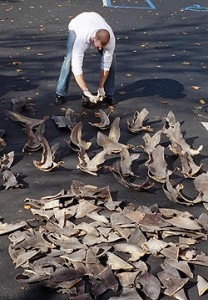

Shark finning is a serious problem as the practice is decimating shark populations around the world. However, the efforts of various non-profits, politicians and governments, and many individuals to ban shark finning have been successful in cities across North America, and the efforts are currently spilling over into Europe.
Shark finning is the act of catching a shark, cutting off all of its fins, and throwing the shark back in the water…still ALIVE. The barbaric procedure is undertaken for a special dish highly desired in Asian countries. Shark fin soup is considered lucky in Asian cultures and holds high status in social circles. It is also a billion dollar industry.
Until recently, shark fin soup could only be afforded by the rich, as the price was extremely high. Now, however, many Asians can afford the dish – meaning millions of people – as China’s population nears 1 billion. So the number of shark fins used for soup has increased drastically; 95% of which are consumed by China.
 China has not yet passed legislation to protect sharks from finning, although efforts are underway. Recently, a hard-fought bill banned the possession and sale of shark fins in California, the largest consumer outside of Asia. The legislation was due to a unique collaboration between many NGOs ranging from the Humane Society to Heal the Bay. Individuals, such as food writers and cartoonists, also helped raise public awareness on the issue.
China has not yet passed legislation to protect sharks from finning, although efforts are underway. Recently, a hard-fought bill banned the possession and sale of shark fins in California, the largest consumer outside of Asia. The legislation was due to a unique collaboration between many NGOs ranging from the Humane Society to Heal the Bay. Individuals, such as food writers and cartoonists, also helped raise public awareness on the issue.
Other governments to ban finning include Hawaii, Oregon, Washington, Guam, the Commonwealth of Northern Mariana Islands, and Chile. Canada is in the process of banning shark fin importation as well, which would stop around 77,000 kilograms from coming into the country per year. Fins and their soup are already illegal in and around Toronto.
Protecting sharks from finning could ignite the public to want Marine Protected Areas in the Oceans. MPAs are hard to sell to the public as they are seen more as an exclusion tool than a protection tool. If MPAs concentrate on protecting sharks within a set of boundaries, than other species found within those boundaries will also be protected. Therefore, managers can use sharks as the fuel to get the public to demand Marine Protected Areas in the Oceans.
This demand for conservation rather than consumption would allow conservation planners to incorporate shark protection into systematic marine conservation planning efforts. An advantage of including sharks in conservation planning is that their distribution is widespread, requiring more area to be considered for protection. If more areas are protected for sharks, then other habitats and species that lie within the boundaries would also be protected.
Do you think that bans on shark finning and on shark fin soup will help systematic conservation planning efforts for our oceans?
– Andrew Lewin, Board Member; and Heather Coleman, Science Advisor